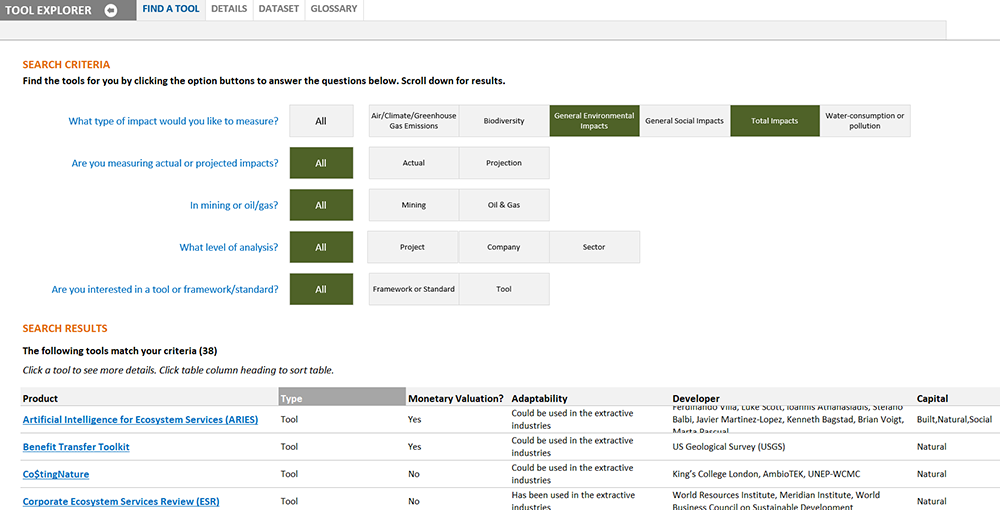
Beyond Revenues: Measuring and Valuing Environmental and Social Impacts in Extractive Sector Governance
Download the tool explorer.
Oil, gas and mining projects can generate substantial revenues for host countries. At the same time, extractive activities generate a range of other positive and negative economic, environmental, social, political, institutional and cultural impacts. Host countries must weigh the economic benefits of extractive projects against their environmental and social impacts.
However, environmental and social impacts are often assessed in separate processes and by separate institutions from those assessing financial revenues and the modeling, measuring and reporting of these impacts is rarely integrated with financial impacts.
This practice results in an incomplete picture of the extractive sector. A more integrated assessment of the impacts of extraction could help policymakers, regulators, companies, citizens and affected communities make more informed decisions on whether extraction should take place and on what terms and conditions.
To better understand whether more integrated modeling and measurement of environmental and social impacts can improve policymaking in the extractive sector, NRGI has undertaken a review of existing practices in measuring environmental and social impacts in the extractive sector of NRGI’s priority countries, including tools available for doing so.
The organization has collated information on various tools, frameworks and standards into a database, the Tool Explorer, that allows users to search for tools based on their interest or needs, including the sector they are studying (whether oil and gas or mining), the type of impact they would like to measure and whether they are interested in modeling potential impacts or measuring actual impacts.
With this report and the accompanying Tool Explorer, NRGI aims to support a conversation on:
- Whether existing tools can adequately measure the environmental and social impacts of extraction.
- Whether the modeling of environmental and social impacts can be integrated with fiscal modeling to inform governments, companies and stakeholders in making the decision to extract or not.
- How extractive sector stakeholders can more effectively integrate the measurement of environmental and social impacts into the regulation and management of the sector to maximize benefits and minimize costs.
- Whether country-level or global-level processes and standards for measuring, valuing and reporting the environmental and social impacts generated by extractive projects can facilitate comparability and better understanding of how well these impacts are being managed.
However, measurement can only support better policymaking if all stakeholders consider the process valid and fair. NRGI proposes the following general principles for using measurement of environmental and social impacts in decision-making within the extractive sector. When used alongside qualitative approaches, these principles could help support an inclusive and transparent measurement process that promotes multi-stakeholder dialogue on extractive sector impacts.
| WHO |
Principle 1. Ensure inclusive multi-stakeholder measurement processes that enable meaningful participation of affected communities, with due regard for gender dynamics and the views of minority and marginalized groups. Principle 2. Involve interdisciplinary teams from the start. |
| WHEN |
Principle 3. Begin measurement of environmental and social impacts before extraction and continue through the life of the project and after closure. |
| WHAT |
Principle 4. Identify material impacts across capitals (built, financial, human, natural or social capital), project scenarios, geographic scales and time horizons. Principle 5. Include in stakeholder dialogue and decision-making frameworks both quantifiable impacts and those that cannot or should not be measured; and consider who bears the costs and benefits of these impacts. |
| HOW |
Principle 7. Ensure measurement approaches are appropriate to the policy question at hand and to the country and local context. Principle 8. Protect legal and customary rights throughout the measurement process, including free, prior and informed consent where applicable. Principle 9. Ensure measurement processes and results are transparent, timely and understandable. |
Explore tools, frameworks and standards for measuring environmental and social impacts.
Authors

Nicola Woodroffe
Senior Legal Analyst

